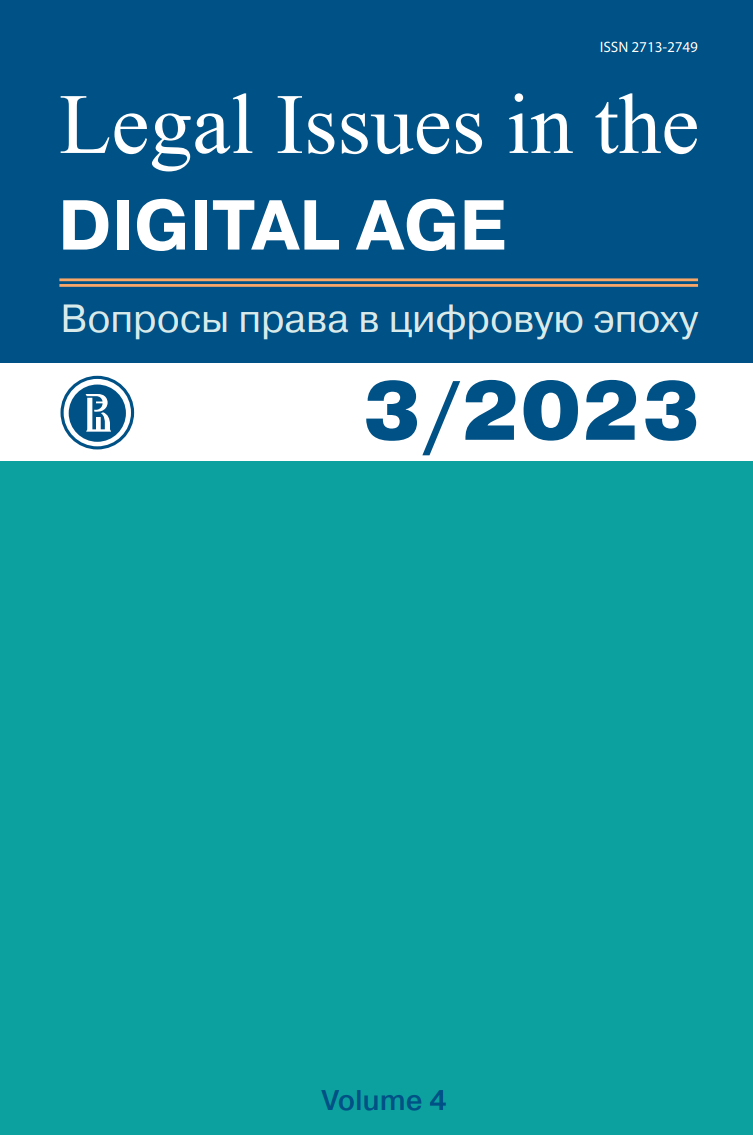Artificial Intelligence vs. Judicial Discretion: Prospects and Risks of Judicial Practice Automation
Abstract
The paper fits into a wide public discussion of the introduction of artificial intelligenceinto the national judicial system, with the underlying risks and legal vulnerabilitiesanalyzed on specific examples of enforcement practices. The effective national legislation on the use of artificial intelligence and the latest international laws on thesubject including the EC’s AI Act Compromise Text were studied. The paper looksinto the risk factors characteristic of judicial discretion and judicial AI both on a comparative and standalone basis. Controversial opinions by law enforcement agencies,national and international researchers, AI developers on the prospects of using AI inthe justice system were explored. The paper provides conclusive arguments that theintroduction of AI is not feasible in the short and medium term in view of the currentrisks and geopolitical environment, state of the legal framework and judicial principles effective in the Russian Federation.
References
Аtazhanov А., Ismailov B. (2020) International experience of introducing modern technologies into the justice system. Obschestvo i innovatsii=Society and Innovations, no. 2, pp. 269–284 (in Russ.)
Barak А. (1999) Judicial discretion. Мoscow: Norma, 376 p. (in Russ.)
Galkin D.V., Stepanov А.V. (2021) Security aspects of military AI applications. Voennaya mysl=Military Thought, no. 4, pp. 72–79 (in Russ.)
Haskins A., Arora S., Nilawar U. (2017) Impact of artificial intelligence on Indian real estate: transformation ahead. Madras: Colliers Radar Property Research, 13 p.
Kharitonova Yu.S., Savina V.S., Panyini F. (2021) A bias of AI algorithms: issues of ethics and law. Vestnik Permskogo gosudarstvennogo universiteta=Perm State University Bulletin, issue 53, pp. 488–515 (in Russ.)
Kok J., Boers E., Kosters W. et al. (2009) Artificial intelligence: definition, trends, techniques, and cases. In: Encyclopedia of life support systems. Artificial intelligence. J.N. Kok (ed.). Paris: Eolss Publishers, 401 p.
Laptev V.А. (2019) The concept of artificial intelligence and liability. Pravo. Zhurnal Vysshey shkoly ekonomiki=Law. Journal of the Higher School of Economics, vol. 12, no. 2, pp. 79–102 (in Russ.) DOI: https://doi.org/10.17323/2072-8166.2019.2.79.102
Makarikhina О.А. (2014) On judicial discretion in civil and arbitration proceedings. Arbitrazhniy i grazhdanskiy protsess=Arbitration and Civil Process, no. 6, pp. 14–17 (in Russ.)
Morkhat P.M. (2018) Judicial AI as a way to overcome judicial discretion. Teoriya i istoriya prava i gosudarstva=Theory and History of Law and State, no. 5, pp. 6–11 (in Russ.)
Morkhat P.М. (2017) On defining the concept of artificial intelligence. Teoriya i istoriya prava i gosudarstva=Theory and History of Law and State, no. 12, pp. 25 –32 (in Russ.)
Pokrovskiy I.А. (1998) Main problems of civil law. Мoscow: Statut, 349 p. (in Russ.)
Rissland E. (1990) Artificial Intelligence and Law: Stepping Stones to a Model of Legal Reasoning. Yale Law Journal, vol. 99, no. 8, pp. 1957–1981. DOI: https://doi.org/10.2307/796679
Russell S., Norvig P. (2010) Artificial intelligence: a modern approach. Boston: Prentice Hall, 1132 p.
Shananin V.А. (2022) Using AI system in judicial practice. Yuridicheskaya nauka=Legal Science, no. 11, pp. 143–146 (in Russ.)
Stepanov О.А., Basangov D.А. (2022) On the prospects of AI impact on legal proceedings. Vestnik Tomskogo gosudarstvennogo universiteta=Bulletin of Tomsk State University, no. 5, pp. 229–237 (in Russ.) DOI: https://doi.org/10.17223/15617793/475/28
Strawson P. (1952) Introduction to logical theory. London: Macmillan, 266 p.
Talapina E.В. (2022) AI-aided data processing and discrimination risks. Pravo. Zhurnal Vysshey shkoly ekonomiki=Law. Journal of the Higher School of Economics, vol.15, no. 1, pp. 4–27 (in Russ.)
Tretyakova Т.N., Karamanukyan D.Т. (2020) The concept of judicial discretion. International journal of professional science, no. 2, pp. 5–8 (in Russ.)
Authors who publish with this journal agree to the Licensing, Copyright, Open Access and Repository Policy.










